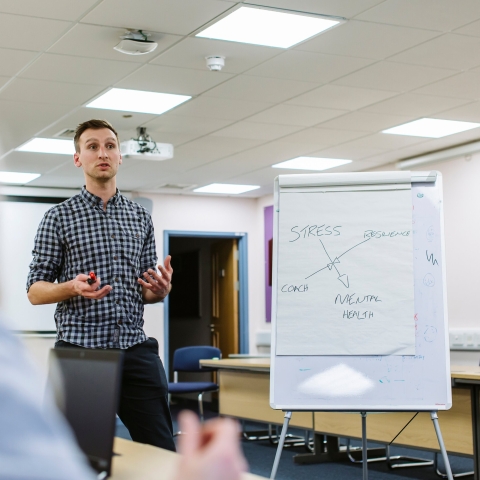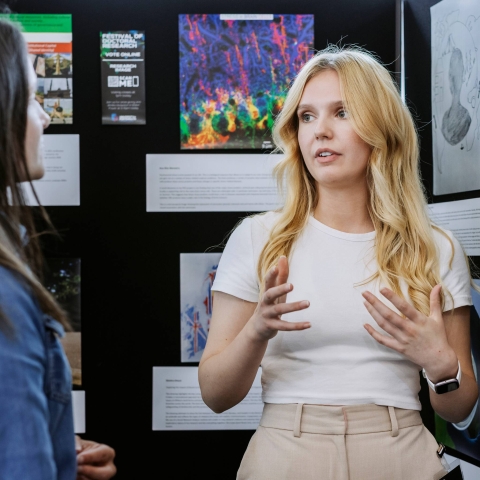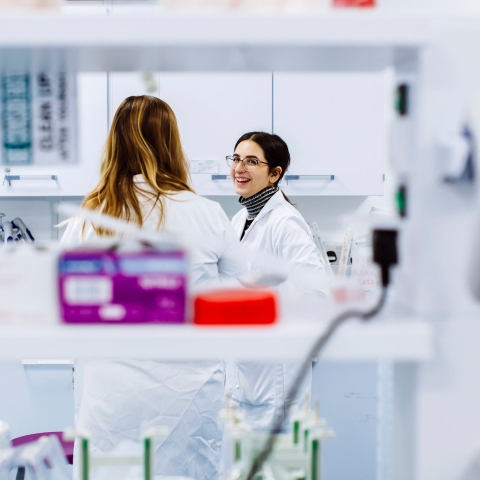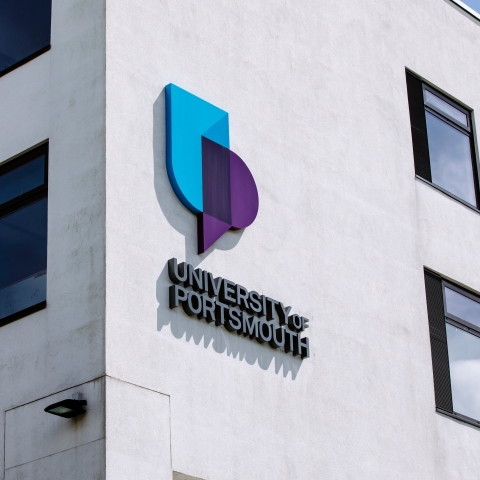

Support for those studying at a distance
From induction to viva we are here for you
A PhD via Distance Learning (DL) allows you to undertake your postgraduate research degree from a location that fits with your current commitments.
As a DL PhD student you will be enrolled full-time or part-time at the University of Portsmouth. You will not be required to visit the campus at any stage of your registration: supervision, training, community events, reviews and examination are provided online through various means including video-conferencing, email, the University Virtual Learning Environment, and online resources developed or subscribed to by the University.
You will need to ensure that you have access to the required resources for your research project, and should discuss this during the PhD application and interview process.
Although you will be based off campus, you can still access the University’s student services and Doctoral College training and events. You can also use the University Library's extensive electronic library and services for distance learners, and our IT support team can help with any questions you have about working online.
Registration and Induction
You will need to complete an online registration at the start of your course, and re-register online each year, via your Student View. You will also need to produce your personal identification (ID) documents as part of an online ID check at the start of your programme. For International and EU students, this is required at the start of each academic year as part of our obligations to UK Visa and Immigration. Find out more about joining the University of Portsmouth.
After you have confirmed your place at the University of Portsmouth you will be invited to the Doctoral College’s online Getting Started with Your Research Induction. This is a three-hour session in which you will have the opportunity to meet other research degree students, be introduced to members of the Doctoral College, find out about doctoral level postgraduate study and be introduced to the Doctoral Development Programme (DDP) and Research Culture events.
The Doctoral College will also arrange online follow-up sessions to enable students working remotely to meet peers and colleagues from across the University, and ask any further questions they may have following induction.
For a list of information to help you get started, please see our Information for New Postgraduate Research Students MyPort page.
Milestones
A PhD via Distance Learning will take 3 years (full-time) or 6 years (part-time) to complete, and you will be required to meet certain milestones during each stage of your PhD, as set out in the Regulations for Research Degrees. You will have a Major Review, one or more Annual Reviews, a deadline for the submission of your Thesis, and the Viva Voce examination. The Doctoral Development Programme offers training and guidance for these important milestones.
Find out more about PhD Milestones via the Research Degree Guidance MyPort pages.
Working with your Supervisor
Your supervisory team will normally include two or three supervisors, with your First Supervisor having responsibility for supervising you on a regular basis. You will need to work with your supervisory team to establish a schedule for your weekly work pattern, including supervisory meetings, training and development and other research activities. The PGR/Supervisor Arrangements UPR1 form has been designed to make sure you have all the information you need during the first 3 months of your registration at the University.
Regular communication with your supervisors is strongly recommended to support your progress, confidence and wellbeing, and records of supervisory meetings and action plans will be maintained on Skills Forge, our postgraduate research management platform. Your First Supervisor should be the first person you speak to if you have any questions or concerns about anything related to your Research Degree. However, if your First Supervisor is not available, we have put together a helpful list of who to contact - other than your First Supervisor - if you have any queries or concerns.
Wellbeing
The Doctoral College is committed to supporting the success and wellbeing of all our postgraduate research degree students, and we are aware of the particular need to maintain regular contact with those working at a distance. We will provide links to the University’s Health and Wellbeing resources, and external sources of support such as The Wellbeing Thesis. The Doctoral College also offers different types of support through our events and development programme, and your School and Faculty will also provide online opportunities to connect with academics and your fellow students.
Training and Development
The Doctoral College provides opportunities for you to attend (online or in-person) training and events; some of these will be vital for your research, and some will help you meet people and feel connected. If you are registered part-time, you will need to complete 5 days of development activity for each year you are registered, or 10 days of activity if you are registered full-time. You should discuss and agree with your supervisor(s) the training and development activities you will undertake, which could include attendance (online or in-person) at Doctoral College workshops and events, conferences, seminars or other external training.
The Doctoral Development Programme (DDP) has been designed to help you become an independent researcher and employable doctoral graduate, and offers training sessions for key doctoral milestones. Our aim is to help you develop the research, professional and transferable skills to succeed in your research degree and beyond. You will also need to attend (online or in-person) research ethics, integrity and governance training.
Many of our DDP workshops run online or in a hybrid format (where people can attend in-person or online at the same workshop), and some are available to complete on-demand through Moodle. You can book onto our DDP workshops via Skills Forge.
The Graduate Students Professional Development (GPROF) course provides a six-part introduction to teaching and learning in Higher Education, and is mandatory for postgraduate students involved in any teaching activity in the University. If you are not going to be teaching but are interested in learning more about teaching and learning in HE, you are welcome to attend (online or in-person).
Other training and development opportunities are offered through the Doctoral College as part of our Research Culture events, including online training delivered in partnership with the University of East Anglia, and access to LinkedIn Learning.
PaDLOC
Our part-time and distance learning students are invited to join PaDLOC (Professional and Distance Learning Online Community). Taking place online from 18:00-20:00 (UK time), PaDLOC offers training and development opportunities whilst fostering a supportive community of doctoral researchers. Running throughout the academic year, the programme includes sessions adapted from the Doctoral Development Programme (DDP), writing workshops and informal discussion and peer support sessions. You can attend whichever sessions you like and will have the opportunity to suggest topics and themes for the programme. Find out more via the dedicated PaDLOC page in Moodle (University login required).
University Library and IT Support
The University of Portsmouth Library provides access to electronic resources including Journals, eBooks and other digital resources. The Support for Distance Learners Library page provides details of the Library services available to you if you are not in Portsmouth, and the Material from Local Libraries page provides information on using your local library services, including SCONUL access in the UK and Republic of Ireland.
The University’s Library and Information Services (LIS) team can help you to manage your university account, connect to University IT services from anywhere, and offer IT Support for any questions you may have. Their Study Anywhere MyPort page provides key information on accessing University services such as the VPN (Virtual Private Network), software and apps for research and study, your email account and spaces for storing your University documents.
The University of Portsmouth’s WiFi service, eduroam, allows you to connect to the WiFi at any of the other 560+ UK institutions who participate. Find out how to connect to eduroam at participating institutions.
Next Steps
If you are thinking about applying for a PhD via Distance Learning, visit our PhD study at Portsmouth page for more information on our PhD application process.
If you are a current PhD student undertaking your research via distance learning, you can refer to our Guidance for Distance Learning and Part-Time Postgraduate Research Students Working Remotely and are welcome to contact the Doctoral College with any questions you may have. Visit the Research Degree Guidance MyPort pages for all the information you need in relation to your Research Degree.
If you are a University of Portsmouth Supervisor, the Doctoral College has dedicated information for supervisors, where you can find online resources and details of the Doctoral College’s Research Supervision Events. Supervisors can find the Regulations for Research Degrees, Research Student Registration (RSR) forms and other guidelines via the regulations and guidance MyPort page.
Enable University alerts
Turn on notifications for critical updates like closures, safety alerts, and urgent service disruptions.














